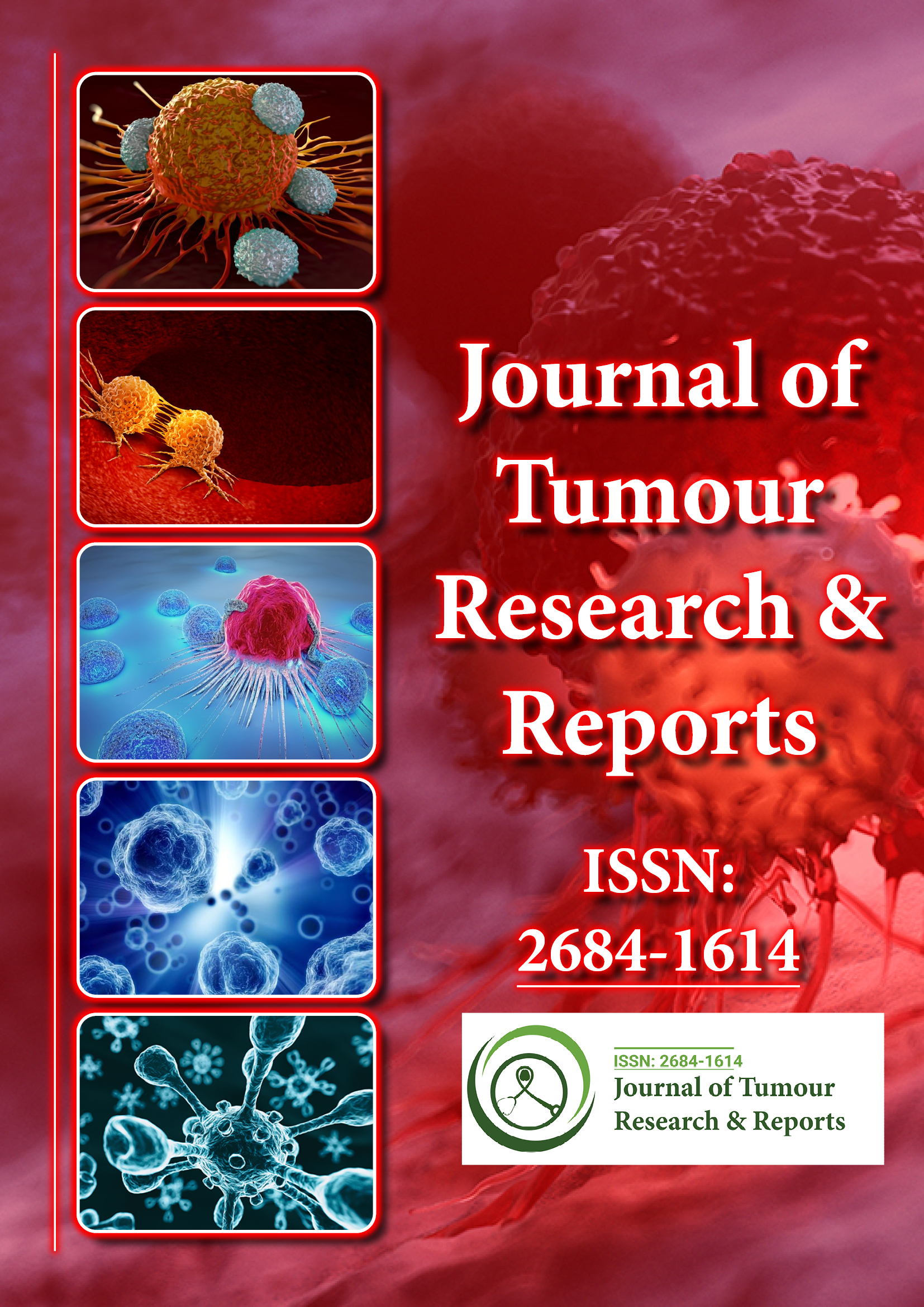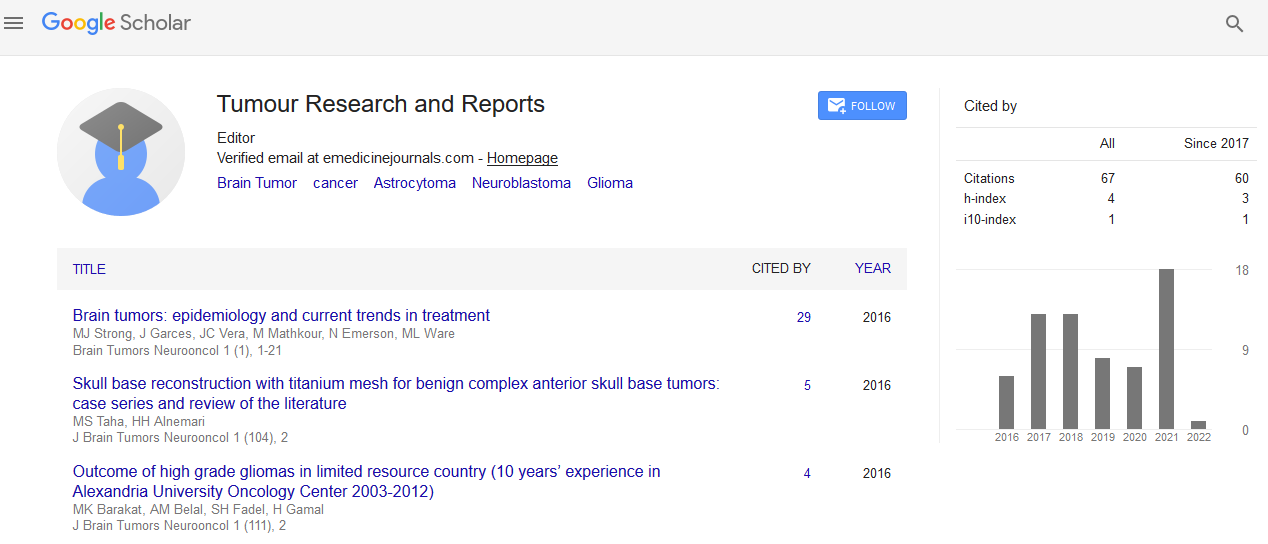Indexed In
- RefSeek
- Hamdard University
- EBSCO A-Z
- Google Scholar
Useful Links
Share This Page
Journal Flyer

Open Access Journals
- Agri and Aquaculture
- Biochemistry
- Bioinformatics & Systems Biology
- Business & Management
- Chemistry
- Clinical Sciences
- Engineering
- Food & Nutrition
- General Science
- Genetics & Molecular Biology
- Immunology & Microbiology
- Medical Sciences
- Neuroscience & Psychology
- Nursing & Health Care
- Pharmaceutical Sciences
Commentary - (2025) Volume 10, Issue 1
Microbiome Influence on Tumour Progression: Unlocking Gut-Cancer Crosstalk
Javier Monteiro*Received: 03-Mar-2025, Manuscript No. JTRR-25-29014; Editor assigned: 05-Mar-2025, Pre QC No. JTRR-25-29014 (PQ); Reviewed: 19-Mar-2025, QC No. JTRR-25-29014; Revised: 26-Mar-2025, Manuscript No. JTRR-25-29014 (R); Published: 02-Apr-2025, DOI: 10.35248/2684-1614.25.10.245
Description
Over the past decade, the human microbiome has emerged as a critical factor influencing a wide array of physiological and pathological conditions, including cancer. The interaction between the host and its microbial inhabitants particularly the gut microbiota has garnered considerable attention due to its capacity to modulate systemic immunity, inflammation, and even the response to anticancer therapies. Tumor progression, long attributed solely to genetic and epigenetic aberrations, is now increasingly understood to be shaped by microbial ecosystems residing in distant organ systems.
Recent studies have demonstrated that the gut microbiome can directly and indirectly influence tumor initiation and progression. Microbes produce metabolites, modulate immune responses, and alter the integrity of epithelial barriers, all of which contribute to the Tumor Microenvironment (TME). Dysbiosis, a state of microbial imbalance, is commonly observed in cancer patients and is associated with pro-inflammatory signaling pathways, particularly in colorectal, pancreatic, and hepatocellular carcinomas.
One of the most compelling pieces of evidence comes from germ-free mouse models, where the absence of gut microbiota results in significant changes in tumorigenesis. For example, germ-free mice injected with colon cancer cells exhibit delayed tumor growth compared to their conventionally raised counterparts. The reconstitution of these germ-free mice with dysbiotic microbiota from tumor-bearing hosts restores the tumor-promoting phenotype, emphasizing the causative role of specific microbial populations.
The mechanisms by which the microbiome promotes or inhibits tumor progression are multifaceted. Certain bacterial species such as Fusobacterium nucleatum and Escherichia coli harboring Polyketide synthase (pks) island have been implicated in DNA damage and oncogenesis. Fusobacterium nucleatum, for instance, has been shown to adhere to and invade epithelial cells, activating β-catenin signaling and promoting proliferation. Meanwhile, bacterial toxins such as colibactin produced by E. coli can cause double-stranded DNA breaks, contributing to genomic instability a hallmark of cancer.
Metabolites derived from microbial metabolism also play a central role in modulating tumor growth. Short-Chain Fatty Acids (SCFAs), especially butyrate, are known to exhibit antiinflammatory and anti-proliferative effects in the colon. However, in certain contexts, SCFAs may support tumorigenesis by serving as an energy source for rapidly proliferating cells. Secondary bile acids, another class of microbial metabolites, have been implicated in liver and gastrointestinal cancers due to their pro-inflammatory and cytotoxic effects.
Immune modulation is perhaps one of the most significant pathways through which the microbiome influences cancer. Commensal bacteria prime the immune system and influence the infiltration of immune cells into tumors. Intriguingly, checkpoint blockade immunotherapy a revolutionary approach in oncology has been shown to depend heavily on the presence of specific gut microbes. Studies have revealed that Bifidobacterium spp. enhance anti-PD-L1 efficacy in melanoma models, while Akkermansia muciniphila improves the response to anti-PD-1 therapy in lung and kidney cancer patients. Fecal Microbiota Transplantation (FMT) from responder patients into germ-free or antibiotic-treated mice recapitulates these therapeutic effects, highlighting the potential of microbiome manipulation in enhancing immunotherapy outcomes.
Despite these insights, translating microbiome research into clinical practice faces significant challenges. The complexity and individuality of microbial communities make it difficult to establish standardized diagnostic or therapeutic protocols. Variability in diet, lifestyle, antibiotic usage, and genetics among individuals further complicate the reproducibility of findings across populations.
Nonetheless, several strategies are being explored to modulate the microbiome in a cancer-preventive or therapeutic manner. These include the use of prebiotics, probiotics, synbiotics, and dietary interventions designed to enrich beneficial microbial species. Precision microbiome editing, using bacteriophages or CRISPR-based approaches, is also being investigated to selectively target pathogenic bacteria without disrupting commensal populations.
Moreover, the development of microbiome-derived biomarkers is a promising area of research. Such biomarkers could be used for early detection, prognosis, or predicting treatment response. For instance, the abundance of certain microbial signatures in stool or mucosal biopsies has been correlated with tumor burden and response to therapy in colorectal cancer patients.
Citation: Monteiro J (2025). Microbiome Influence on Tumour Progression: Unlocking Gut-Cancer Crosstalk. J Tum Res Reports. 10:245.
Copyright: © 2025 Monteiro J. This is an open-access article distributed under the terms of the Creative Commons Attribution License, which permits unrestricted use, distribution, and reproduction in any medium, provided the original author and source are credited.

